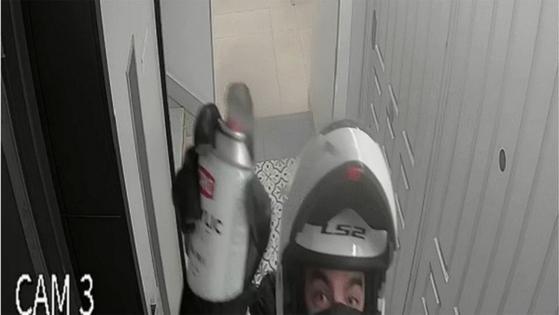Florida man pleads not guilty to killing wife in Spain in possible death-penalty case
Published in News & Features
MIAMI — A Fort Lauderdale man who is accused of traveling to Spain in a plot to murder his estranged wife pleaded not guilty on Thursday to charges of kidnapping and killing her in February in an international case headed for trial in Miami federal court next year.
David Knezevich, 36, a naturalized U.S. citizen from Serbia who was arrested in May on a kidnapping charge, now faces a potential death penalty after being charged anew with kidnapping resulting in his wife Ana’s death. He’s also charged with foreign domestic violence resulting in death and foreign murder of a U.S. national, according to the amended indictment.
Prosecutors in the U.S. Attorney’s Office in Miami are still waiting for the Justice Department to decide whether they can pursue the death penalty, a decision that might come in January — one month before a scheduled trial that is likely to be delayed.
If prosecutors don’t opt for the death penalty, Knezevich, if convicted, would face a potential maximum sentence of life in prison.
“We are hopeful that it’s not going to be a death penalty case,” Knezevich’s defense attorney, Jayne Weintraub, told a judge in Miami federal court on Thursday. “There is no smoking gun. There is nothing that is spectacularly new” about evidence in the case since his arrest in May upon returning from Serbia.
The charge of kidnapping resulting in death marked a dramatic shift in the largely circumstantial case surrounding 40-year-old Ana Knezevich Henao’s disappearance from her Madrid apartment in early February. Before the Colombian-American’s presumed death, the couple was going through a difficult divorce while fighting over millions in Broward properties they acquired during their 13-year marriage.
At the hearing on Thursday before U.S. District Judge Kathleen Williams, prosecutors proposed postponing the trial to June, citing delays in receiving evidence from the Spanish National Police, including crime-scene photos, fingerprints and other key information.
Assistant U.S. Attorney Jessica Obenauf said she’s still waiting for the “most important information from Spain” and that a Spanish judge said the evidence would not be delivered to federal authorities until February. Obenauf also said she’s still working on arrangements for prosecutors and defense attorneys to travel to Madrid in January to visit Ana Knezevich’s former apartment building and the apartment itself. She’s also scheduling depositions with foreign witnesses during the visit.
Weintraub said that her defense team, including Bruce Zimet and Christopher Cavallo, was ready to start trial as scheduled in February but suggested that it could be delayed until late March.
“This case has been delayed since May 4,” Weintraub said, referring to her client’s arrest at Miami International Airport upon his return from Serbia. “It’s just one delay after another.”
Williams said she will soon decide on when to start the trial, but also expressed her frustration.
“It is a little concerning that it’s taking this long,” the judge said.
For months, the FBI has been been coordinating its investigation with the Spanish National Police, gathering suspicious security-camera footage of David Knezevich’s presence in a Madrid hardware store and at her apartment just before her disappearance, as well as fabricated text messages and stolen license plates on a rental car suggesting a cover-up. However, authorities found no evidence of blood traces or a struggle in the estranged wife’s Madrid apartment after she was reported missing.
In two consecutive detention hearings, a magistrate judge in Miami ordered that Knezevich remain in a federal lock-up because he considered him a “serious flight risk.”
After the second hearing, Magistrate Judge Edwin Torres concluded “there is ample evidence” to support the kidnapping case against Knezevich, whose lawyers had asked the judge to reconsider his initial detention order.
“Indeed, the evidence produced at the second hearing supports the Court’s original finding that [Knezevich] presents a serious risk of flight given the cunning level of deception that he has demonstrated as part of the crime he is alleged to have engaged in,” Torres ruled in a 17-page order in September.
Knezevich, who operated a tech business, owned millions of dollars in Broward County residential real estate with his wife, a native of Colombia. They were fighting over these and other assets when she left for Spain in late December 2023. He’s accused of leaving Miami the following month with a plan to track her down. She was reported missing by authorities on Feb. 2.
The FBI believes the husband carried her body in a suitcase out of her Madrid apartment building that evening, citing security-camera footage of him exiting the elevator.
In August, the FBI joined Spanish and Italian authorities in a search for her corpse in the woods north of the city of Vicenza in Italy, where a GPS alert on the husband’s rented Peugeot 308 suggested he took a detour there on his return trip from Spain to Serbia.
The wife’s corpse, however, was not found.
©2024 Miami Herald. Visit at miamiherald.com. Distributed by Tribune Content Agency, LLC.







Comments